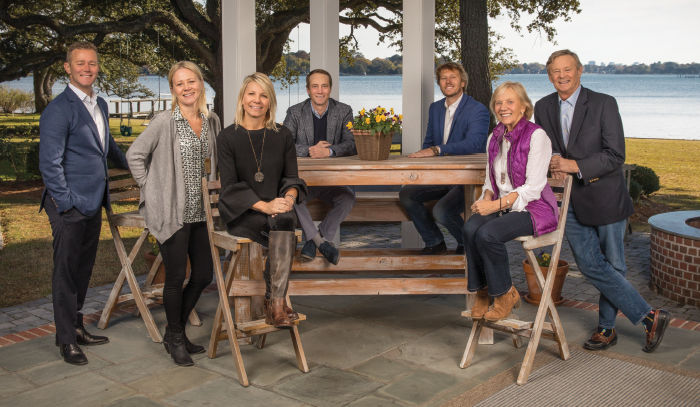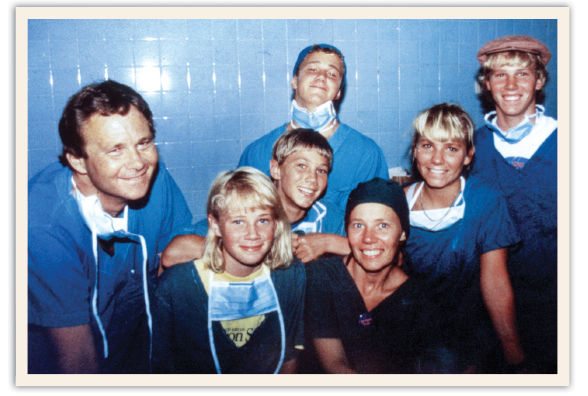Operation Smile changes lives, even their own
Brigette Magee slapped the scalpel into the surgeon’s palm, just as her father had taught her to. She was 13, standing at the side of a child in the Philippines, acting as a scrub nurse to a volunteer repairing a child’s cleft palate.
It’s an unusual thing for a teenager to do, unless you’re a Magee.
Brigette’s sister, Kristie, was 8 when her parents took her and their brother Trevor to Colombia, where they changed bandages on orphans in the burn unit. Their brother Billy remembers the heat and poverty as he helped his parents take care of both Israelis and Palestinians on the Gaza Strip.
Their parents, Kathy and Bill Magee, founded Operation Smile, a nonprofit that travels the world providing free surgeries to children with facial birth defects. The Virginia Beach organization recently celebrated its 35th anniversary.
It was in 1982 that the nurse and plastic surgeon were so moved by experiences on a trip to the Philippines that they returned, bringing with them an infantry of surgeons and pediatricians, nurses and students, all willing to travel at their own expense to rebuild the faces of children, and in the process save lives.
Since then the organization has expanded into country after country, bringing American know-how and supplies to treat deformities and train local medical professionals. Last year, more than 3,400 volunteers from 54 nations conducted 166 medical missions across 28 countries.
The sheer number of children’s lives changed by Operation Smile is staggering – some 20,000 a year are operated on – but it is not limited to the patients. The organization, and its mission, left an indelible mark on the five Magee kids, all of whom learned early the importance of a life of service and the joy it brings.
“We used to call it the Magee family,” says Kristie Magee Porcaro. “Now we call it the Operation Smile family.”

Today some of the Magees practice medicine; others continue philanthropic work. From left are Bill III, Kristie, Brigette, Trevor and Todd, and parents Kathy and Bill Jr.
In interviews the family doesn’t talk of the long hours on planes, or the discomfort of foreign beds. They talk instead of the bravery of the children they treated, of the one who didn’t complain when a clamp inadvertently pinched her skin, of the parents who entrust them to the volunteers’ care.
“It struck me when I was 13 that these kids have a lot of courage, as do their parents,” says Brigette, now Brigette Clifford. “Day in and day out these parents are handing us their kids and having complete faith in us to take care of them. It is a tribute to our volunteers and our in-country people that we are able to take care of these kids the way we would in the United States.”
When Kristie talks of the trip to Colombia when she and Trevor changed burn victims’ bandages, she doesn’t speak of the smell or the fear or the dirt. She talks of how they played, kid to kid, and how she and Trevor cried when they had to leave.
“Who will take care of them when we’re gone?” they asked.
It’s that sense of responsibility, of being able to do good in the wider world, that has been the greatest gift to the Magee family, says Bill Magee. He had a thriving plastic surgery practice; the family took great vacations and lived in a lovely home.
“We had it good, so how would we have grounded our kids and taught them how blessed they are?” he says. “You can say it all you want, but until they see and feel it, how can they know it? They had to be outside the box in a situation that opened their eyes and hearts. Operation Smile’s greatest gift to us was being able to ground our kids.”
Kristie grew up and became a nurse, then transitioned into a job as a fund-raising consultant in Manhattan. When she would come home from work trips she’d tell her own children about what she’d seen and done, but it wasn’t until she had returned to Tidewater and started raising funds for Operation Smile that she felt most proud.
Brigette, the oldest of the Magee kids, invests her time working on the student programs that carry the family’s legacy into the future. She was part of the first student group at Norfolk Academy, and traveled to the Philippines with them when she was 16. She started a group in college in Baltimore, raising funds for surgery.
“They say the earlier you get involved, the more it sticks with you,” she says. So now her kids are hooked, as are their friends. “The kids and parents love it because they are doing something purposeful and productive. It gives them the means to be a leader, and it’s something that’s easy to get your brain around; it’s kids helping kids.”
Each of the Magee kids was changed by their family’s involvement in Operation Smile.
“It had such an effect on all of us,” says Billy, now a plastic surgeon in California. “As I searched for the ways I would lead my professional life, I couldn’t think of a better way to do it than to continue this effort. There are so many kids to be cared for, so many communities trying to evolve across the world, and there’s still a need for people to commit themselves in order to improve things.”

The Magee kids assisted in surgery, changed bandages on burn victims, worried, wept. This photo was taken in Manizales, Colombia, on the only mission that included the entire family.
Billy went through four years of dental school, four years of medical school, an exhausting fellowship. “Any time there were weak moments, times I wanted to give up,” he says, “it was those experiences that pushed me.”
Indeed, in his office hangs a photo from a childhood trip to Kenya, where he played with and helped care for children speaking “beautiful Swahili English,” the hospital hallway so dark that he could barely make out their faces.
“Whenever you have times that are difficult and you remember the experiences that were so vivid,” he says, “they can drive you through the challenges of your life.”
As director of international programs for the division of plastic surgery at the University of Southern California, Billy is also a researcher into the causes of cleft deformities, working with Operation Smile’s International Family Study, which has collected a genetic inventory of more than 13,000 saliva samples from 5,600 families around the world.
His team has learned that advanced maternal age and hypertension are contributing factors, as are poverty and pollution, among other things. There will be a vaccine some day, he says, and while it won’t wipe out clefts completely, it still will save hundreds of thousands of children, since infants with facial deformities die at 15 times the rate of children with intact palates, largely because they have a hard time feeding.
Another Magee offspring, Trevor, grew up to become an orthopedic surgeon based in Park City, Utah. When the earthquake devastated Haiti he was still in his residency at Pennsylvania State University. His dad called up one of the professors and said,
“Listen, Operation Smile is in Haiti. We’re not able to do cleft surgeries right now, but we can do crush wound injuries. Could you mobilize some of your team to do ortho in Haiti?” And off they went.
Now Trevor volunteers for Operation Walk, an organization inspired by Operation Smile that repairs skeletal abnormalities.
Their brother Todd is a businessman living in New Jersey who donates his skill and time to help the organization grow. He and his wife adopted a daughter from Vietnam. She is nearly old enough now to join an Operation Smile mission back in her country of birth.
“Our parents put us in situations that most kids would never go through,” Kristie says. “We’re more resilient, we really care about people, and we really care about our family and where this organization is headed.”
The next generation is already preparing. One day recently Brigette received an email from a woman in Nicaragua who was getting a permanent cleft center built there and making sure the children of her country are taken care of. Attached was a photo of Brigette’s son, standing with the woman’s daughter. He was there on his gap year to help his uncle collect saliva samples, to someday find a cure.
“It’s hard in your day in and day out when people complain about things,” Brigette says. “We knew even as kids that we could accomplish anything in this world, because our parents showed us this never-give-up attitude.”
They’re in it for the people, for the friendships, for the sense of family they feel all over the world.
“There’s trust and respect and a true sense of family within the organization,” Kristie says. “As siblings, we hope to carry that legacy on, to keep the culture and the respect, similar to what our parents have done.”
